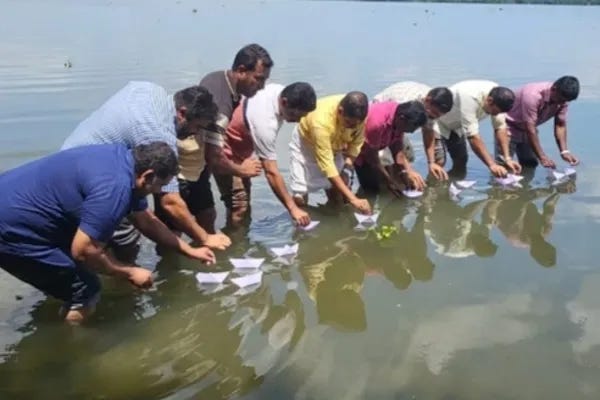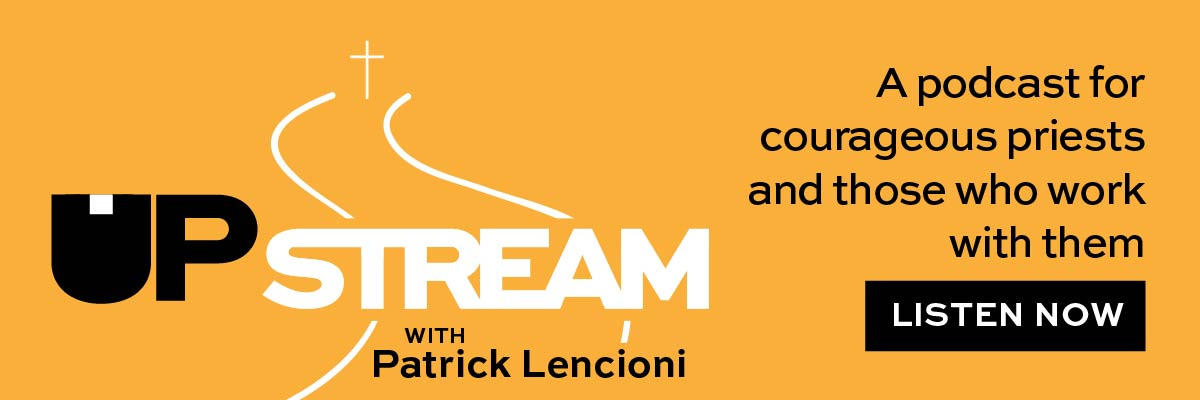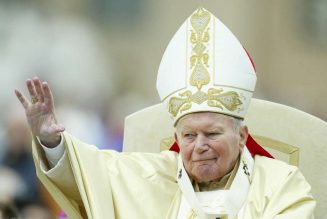Pillar subscribers can hear JD read this Pillar Post here: The Pillar TL;DR
Hey everybody,
Today is the feast of St. Guy of Baume, and you’re reading The Tuesday Pillar Post.
Not much is known about old St. Guy — he was a 10th century abbot at Baume Abbey, which, by some accounts, was founded in the 600s, destroyed by raiders in the 700s, refounded in the 800s, and then had a pretty good run of nearly 1,000 years, before the French Revolution expelled all the monks.
Anywho, Guy was abbot in the early 900s. He got the job when Baume’s abbot, St. Berno, became responsible for founding the eventually powerful monastery at Cluny. Guy, for his part, eventually retired from Baume, and fled the monastery to become a hermit.
Try as I might, I can’t find a painting of St. Guy de Baume. But here’s another famous guy, America’s Favorite Game Show Host, who was probably named for the hermit-abbot of Baume.
At any rate, Guy is an interesting guy and all that, but I wanted to tell you about something else before we get to the news.
Tomorrow, June 19, marks 1,699 years since the opening of the first ecumenical council at Nicea.
For canon lawyers like me, the Nicene Council is remembered for giving us some important disciplinary canons, like a prohibition against clerical cohabitation, recognition of patriarchal jurisdiction in Rome, Antioch, and Alexandria, the establishment of irregularities for orders, and a prohibition (very, very wise) against putting neophytes too quickly into ecclesial leadership positions.
But great as those canons are — and the Nicene canons are often underappreciated for their place in canonical history— the Nicene council also gave us the Nicene Creed, which was subsequently amended at the Council of Constantinople, to become the Nicene-Constantinoplitan Creed we say at Mass.
(Constantinoplitan is an awesome word, by the way. Though I suppose now people say Istanbuilian.)
That creed is a gift for us, which St. Augustine called a “symbol of the holy mystery.”
Here’s how Benedict XVI put it:
“Not without reason, Christians in the early centuries were required to learn the creed from memory. It served them as a daily prayer not to forget the commitment they had undertaken in baptism.”
In another place:
“On Sunday, in the Holy Mass, reciting the Creed, we speak in the first person, but we confess as one the one faith of the Church. That ‘I believe’ said individually joins a vast chorus across time and space, in which each person contributes, so to speak, to the harmonious polyphony in faith. The Catechism of the Catholic Church sums this up in a clear way: thus, ‘believing’ is an act of the Church. The Church’s faith precedes, engenders, supports and nourishes our faith. The Church is the Mother of all believers.”
Professing the Creed unites us to the Church — to the inter-connected communion of faith and sacraments, which draws us deeper into the eternal drama of Light from Light, true God from true God.
The news
The report alleges that defense attorneys were intimidated by men following them on motorbikes, that Pope Francis authorized illegal wiretaps, and that judges have not issued their judicial sentence in the trial that convicted Mincione.
Of course, as with any part of the Vatican finance trial, all of this is complicated. And I suspect this UN complaint is not going to go very far.
Want to understand why? Read our reporting here.
—
There were huge protests this weekend in the Indian state of Kerala, after a letter announced that Syro-Malabar Catholic clerics must accept a new liturgy or face possible excommunication.
The protests saw opponents of the “uniform liturgy” burn copies of the letter across the archeparchy — and in a novel act of protest, some Catholics made paper boats of the letter, and sailed them out into India’s Vembanad Lake.
What’s happening in India is the latest stage in a years-long standoff over Syro-Malabar liturgy, which has become a high stakes test of clerical obedience and of episcopal resolve.
Will more than 300 clerics continue to defy the leadership of their Church over liturgical rubrics? Will bishops have the resolve to declare excommunicated more than 300 priests?
Or will this high-stakes game of liturgical chicken just go on as it has for years, with bishops issuing precepts, promising each time that they’re really serious this time, and priests continuing to do exactly what they wish?
Only The Pillar covers this complicated story in its fullness. So read the latest.
Upstream, a new podcast from Patrick Lencioni, provides ideas and encouragement so courageous priests can more effectively run their parishes and spread the Gospel. Pat is not only a passionate Catholic but is the pioneer of the organizational health movement and one of the world’s foremost experts on leadership and teamwork.
Thousands of Catholics have experienced those pilgrimages as Eucharistic processions in cities and dioceses across the country. But on each pilgrimage route, a small group of pilgrims is living the trip every single day, traveling everywhere with the Blessed Sacrament, and staying in a different home every night.
What’s their daily life like? Where do they experience grace? What do they eat?
Jack Figge embedded with those pilgrims, to find out.
—
The Diocese of Steubenville announced Friday that Bishop Paul Bradley has been replaced as apostolic administrator. The decision came amid an ongoing evaluation of the prospect of merging the Steubenville diocese with its neighboring Diocese of Columbus — a move that Bradley said he believed was unnecessary.
The bishop’s removal came as a shock in Steubenville, where after nine months, Bradley had earned the trust and affection of many local clerics and lay Catholics, because of his penchant for plain-spoken truth-telling, and his willingness to be direct about his own views.
The Pillar was first to report that Bradley had been relieved of his office in Steubenville (working on that is why I had to step out of the USCCB meeting for a while), and our reporting is worth reading.
—
But the removal of Bradley is worth paying attention, as is the prospective merger. In fact, I think it’s one of the most important U.S. Catholics stories in years. Because if it’s true that Bradley was removed because he expressed reservations about a plan to merge the dioceses, well, that doesn’t bode especially well for the due process rights of bishops.
And the Steubenville merger process was once touted as a “template” for future mergers. But as I wrote in an analysis this week, to date, that template has meant demonstrations outside of a diocesan chancery, priests writing letters of opposition, the demotion of one bishop, and then the removal of a temporary one.
So whether you think the Diocese of Steubenville should be merged or not, this story is also about process, governance, and, dare I say, synodality. And that should be of concern to all of us.
Read my analysis on those fronts, here.
And please allow me to point out one other element of the Steubenville merger process that I find worth mentioning.
Since the prospect of the merger was announced in 2022, some local Catholics in the Ohio Valley have pointed out that merging Steubenville into Columbus just doesn’t feel like a fit. Steubenville is Appalachia, they point out, while the Columbus diocese consists of a growing, cosmopolitan city with large healthcare, financial, and education sectors, along with a ring of suburbs, and a healthy dose of farmland, as well.
While there’s plenty of overlap, and regional lines tend to be gradient, there is a sense among some clerics in Steubenville, at least, that the dioceses of Steubenville and Columbus come from different cultures, and that will present a problem if they are merged.
In light of that, some have asked whether Steubenville wouldn’t be better merged with the Diocese of Youngstown, to its north. But Youngstown has its own set of challenges, and a merger likely wouldn’t make them go away.
And to be clear, there are plenty of people saying that the Diocese of Steubenville really doesn’t need to be merged at all — Bishop Bradley himself said as much in an interview a few months back — but if it did, area Catholics have said Columbus doesn’t seem like a cultural fit.
For myself — and again, not conceding that Steubenville needs to be merged — I’ve wondered whether the Diocese of Wheeling-Charleston, West Virginia wouldn’t make more sense, at least by some measures.
Wheeling-Charleston is an Appalachian diocese, like Steubenville, and the economies and cultures of West Virginia bear a lot of similarity to southeastern Ohio.
Also, the Wheeling-Charleston diocese has access to money, rare for a diocese, thanks to its oil and gas holdings down in Texas.
I doubt, though, that the Holy See considered that prospect, because of its general tendency to establish dioceses which don’t cross political boundaries. In the U.S., we have only three dioceses, by my count, whose boundaries cross state (or state equivalent) lines. In some ways, this makes sense. It is certainly easier, for example, for dioceses to administer Catholic schools, priest pensions, charitable outfits, etc, when they have only one set of state laws with which to comply. And bishops tend to lobby the legislatures in their states, meaning that bishops with dioceses across state lines would have extra duties on that front.
But if institutional disaffiliation will continue in the U.S., as I think it will, and Mass attendance will continue to decline (as I hope it won’t, but think it will) eventually the Holy See will need to consider more dioceses which cross state lines — and might find that, for isolated parts of some states, or for areas where particular cultures transcend state lines, there are advantages to that approach.
It could be attempted experimentally by unions ad personam — which is to say, by allowing small dioceses to remain intact, but entrusting them to the leadership of neighboring bishops. That arrangement is not permanent, but could be a way to study whether state lines are really the difficult barrier that the Holy See has seemed to presume.
We shall, almost certainly, see more dioceses merged in the decades to come. Experimenting with ad personam arrangements, and with crossing state lines, would probably be a good way to learn what works.
An appreciation
The USCCB announced Tuesday morning, just a few hours ago, that the bishops have passed “Listen, Teach, Send,” their new “pastoral framework” on youth and young adult ministry.
The document came up for a vote last Friday at the USCCB meeting in Louisville, but it didn’t pass then. There was in the room overwhelming support for the document — and I suspect that some of the bishops had even read it — but there weren’t enough voters in the room to get the required number of “aye” votes, two-thirds of the total conference membership.
This came as a surprise to me, because NINE MINUTES before “Listen, Teach, Send” failed to pass, the bishops passed another document, “Keeping Christ’s Sacred Promise,” which also required two-thirds of the conference membership to assent.
“Keeping Christ’s Sacred Promise” got 181 aye votes, one more than it needed, and passed. “Listen, Teach, Send,” got 178 aye votes, two fewer than it needed, and failed to pass — meaning that the all bishops who weren’t in the room had to be polled by email before it could pass.
Now, it is true that this meeting was not especially well-attended, so the margins were razor thin. But “Listen, Teach, Send,” came at the end of a lengthy voting session, and I suspect the two aye votes missing for the document could have been found at the coffee station in the hallway, or in the bathroom, where a bishop or two might have been relieving himself.
When I realized that, I considered how much I missed the presence at the meeting of longtime meeting parliamentarian Archbishop Dennis Schnurr.
Schnurr was not at the meeting because he is battling stage 3 bowel cancer. I’m sure he’d appreciate your prayers. Another bishop, I’m sure quite capable, served as the meeting’s parliamentarian.
But Schnurr served in that role for several episcopal meetings, and more than once I saw him help to resolve some sticky procedural issue with his deep track knowledge of “Robert’s Rules of Order,” and his brilliantly pragmatic mind.
I am not a parliamentarian. But when I realized what happened with the “Listen, Teach, Send” vote, I figured that if Schnurr had been there, he might have been able to prevent the missed vote, with either a count of the house before the vote, or a call to order, or some other preventive parliamentary order — or he could have weighed in on whether the missing bishops could have been retrieved from the bathroom, and a “motion to reconsider” give them another chance to vote right then and there.
I missed Schnurr as parliamentarian, because I enjoy watching people excel, especially when they really understand something that’s pretty obscure to the rest of us, like the minutiae of “Robert’s Rules.”
That’s the reason, by the way, why I’m looking forward to the new inclusion of breakdancing in this year’s Summer Olympics. Not because I care about breakdancing, mind you, or because I know anything about it, but because I am eager to listen to the breakdancing commentariat geek out, with a great deal of joy, I expect, as they explain to us what makes for a successful knee drop, how it’s different from the hook drop, and why a certain baby freeze deserves only nine points, instead of 10.
I’m even looking forward to the inevitable scandal we’ll see when the French breakdancers (I presume) accuse judges of being on the take, and suddenly we’ll have two weeks of everybody on social media pretending to be expert in the scoring requirements of the hopping air chair.
It’ll be great fun, because I’ll hardly understand it, but I’ll fully appreciate both the fanatical passion of those who do, and the feigned passion of those who don’t really understand it, but want to be in the know.
Anyway, my enthusiasm for enthusiasm is also why I was so excited to read this week about the Excel World Championship, an annual Las Vegas tournament in which prolific spreadsheet guys compete to solve puzzles using Microsoft’s popular software.
Now, I must confess something to you readers, and it’s embarrassing.
Here goes:
I have never, in my life, made a spreadsheet. Sure, I’ve used Excel to track phone numbers and email addresses, and we sometimes use spreadsheet software to track which Pillar stories are in progress at any particular time.
But in terms of creating the thing whereby those boxes have formulas and can do math?
No. I’ve had a moderately successful two decades in the working world, and I’ve never made one of those.
While I’m confessing, I should say that I only made my first PowerPoint last year, and it was pretty bad.
But I don’t need to understand Excel to appreciate the excitement of watching world-class number crunchers do their thing, or of listening to once-great number crunchers marvel from the commentary booth at what the current generation of hotshot spreadsheeters can accomplish.
And I don’t need to have experience with any number-crunching to have an opinion on the latest controversy running through competitive data-entry: Whether spreadsheeters should all begin with a freshly installed version of Excel on a clean laptop, or whether they should be permitted to bring with them pre-made formulas and equations they can utilize to compete. This is a doping scandal, and I side with the purists.
Now listen, I’m not saying that Archbishop Dennis Schnurr’s parliamentary skills are the same level of nerdery as the Excel World Championships. I’m saying that I love seeing people thrive in the small things they’re really great at.
With that said, Schnurr was the treasurer of the U.S. bishops’ conference, and at one time was general secretary of the conference. He almost certainly knows his way around a spreadsheet.
The archbishop turns 76 this week, and Pope Francis will eventually need to accept his retirement. When the archbishop is finally relieved of his Cincinnati duties, perhaps he’ll consider some local spreadsheet tournaments.
I bet he’s a purist, too.
Please be assured of our prayers, and please pray for us. We need it.
And seriously, please subscribe to The Pillar. We depend on you.
Yours in Christ,
JD Flynn
editor-in-chief
The Pillar
Upstream, a new podcast from Patrick Lencioni, provides ideas and encouragement so courageous priests can more effectively run their parishes and spread the Gospel. Pat is not only a passionate Catholic but is the pioneer of the organizational health movement and one of the world’s foremost experts on leadership and teamwork.
Comments 32
Services Marketplace – Listings, Bookings & Reviews












